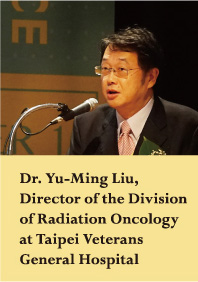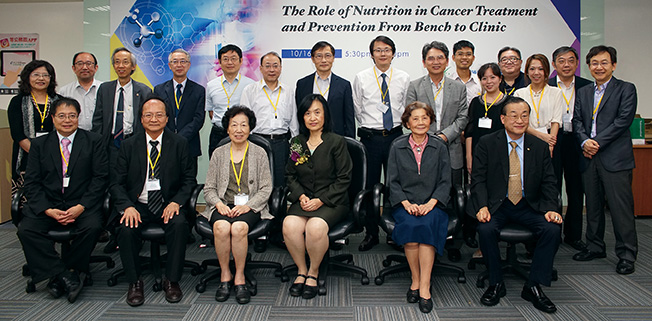2016 Important Breakthrough: Nutraceutical Application on Critical Diseases (II)
 Total nutritional intervention has synergistic effect with radiation therapy
Total nutritional intervention has synergistic effect with radiation therapy Traditional cancer treatments include surgery, radiation and chemotherapy, as well as other modalities. Radiation therapy kills a tumor by destroying the DNA structure of the cancer cell. Higher dosages of radiation have a better therapeutic effect, but also increase damage to normal cells, resulting in many side effects. Studies have indicated that some natural nutrients provide beneficial additive effects when combined with chemo- or radiation therapy, by enhancing the responsivity of tumor cells to treatments. An animal study conducted by Dr. Yu-Ming Liu, Director of the Division of Radiation Oncology at Taipei Veterans General Hospital, and Dr. Chang-Jer Wu, Professor of Department of Food Science at National Taiwan Ocean University found that total nutritional intervention during radiation provided several benefits. The paybacks included significant reductions in tumor weight, inflammatory markers and metastasis and protection against body weight and muscle loss. Therefore, total nutritional support can improve radiation therapy outcomes and reduce its side effects.
Traditional cancer treatments include surgery, radiation and chemotherapy, as well as other modalities. Radiation therapy kills a tumor by destroying the DNA structure of the cancer cell. Higher dosages of radiation have a better therapeutic effect, but also increase damage to normal cells, resulting in many side effects. Studies have indicated that some natural nutrients provide beneficial additive effects when combined with chemo- or radiation therapy, by enhancing the responsivity of tumor cells to treatments. An animal study conducted by Dr. Yu-Ming Liu, Director of the Division of Radiation Oncology at Taipei Veterans General Hospital, and Dr. Chang-Jer Wu, Professor of Department of Food Science at National Taiwan Ocean University found that total nutritional intervention during radiation provided several benefits. The paybacks included significant reductions in tumor weight, inflammatory markers and metastasis and protection against body weight and muscle loss. Therefore, total nutritional support can improve radiation therapy outcomes and reduce its side effects.
 Lean muscle mass is more important than body weight for Nutritional assessment in Cancer Patients
Lean muscle mass is more important than body weight for Nutritional assessment in Cancer Patients
Sarcopenia, the degenerative loss of skeletal muscle mass, quality, and strength associated with aging or diseases is an invisible killer in cancer patients. Muscle is the largest tissue in the human body by mass. Cancer patients with the same body weight but possessing a different lean muscle mass will have a different prognosis. Sarcopenia increases infection, inflammation, the toxicity of chemo- and radiation therapy, neuropathy, and length of hospital stay. In addition to monitoring cancer patient body weight, non-invasive instruments such as Computed Tomography (CT) scan, Magnetic resonance imaging (MRI), Dual-energy X-ray absorptiometry (DEXA) are available to determine the amount of lean muscle mass after treatment. To ensure better positive outcomes supplement with appropriate total nutrition to help patients maintain muscle mass, improve nutritional status and improve their immune system capacity.
 Total nutritional support effectively reduce cancer cachexia
Total nutritional support effectively reduce cancer cachexia
Cancer is not a single organ problem, but is caused by long-term stimulation from an adverse environment leading to gene mutation. Nearly 80% of cancer patients experience malnutrition and cachexia. Cachexia occurs after abnormalities of the endocrine system and metabolism develop in cancer patients, including increased protein breakdown and decreased protein synthesis which result in muscle atrophy. Chemotherapy exacerbates cachexia by accelerating muscle atrophy and adipose tissue loss. The study found that supplementation with whey protein-containing total nutrient formula, natural (TG) form of fish oil and selenium yeast, can reduce muscle atrophy and fat loss, and ultimately reduce cachexia. If applied clinically the study results should help cancer patients prevent cachexia and increase their chemotherapy survival rate.
Nutraceutical treatment is an integral part of our future health care system, however, the enactment of relevant laws and regulations recognizing and implementing typically lags behind scientific findings by several years. In order to help more patients with cancer or chronic disease, New Health remains dedicated to scientific research for decades to come. Nutraceutical implementation will hopefully sooner than later become accepted clinical practice in order that many more people can be helped.




 Traditional cancer treatments include surgery, radiation and chemotherapy, as well as other modalities. Radiation therapy kills a tumor by destroying the DNA structure of the cancer cell. Higher dosages of radiation have a better therapeutic effect, but also increase damage to normal cells, resulting in many side effects. Studies have indicated that some natural nutrients provide beneficial additive effects when combined with chemo- or radiation therapy, by enhancing the responsivity of tumor cells to treatments. An animal study conducted by Dr. Yu-Ming Liu, Director of the Division of Radiation Oncology at Taipei Veterans General Hospital, and Dr. Chang-Jer Wu, Professor of Department of Food Science at National Taiwan Ocean University found that total nutritional intervention during radiation provided several benefits. The paybacks included significant reductions in tumor weight, inflammatory markers and metastasis and protection against body weight and muscle loss. Therefore, total nutritional support can improve radiation therapy outcomes and reduce its side effects.
Traditional cancer treatments include surgery, radiation and chemotherapy, as well as other modalities. Radiation therapy kills a tumor by destroying the DNA structure of the cancer cell. Higher dosages of radiation have a better therapeutic effect, but also increase damage to normal cells, resulting in many side effects. Studies have indicated that some natural nutrients provide beneficial additive effects when combined with chemo- or radiation therapy, by enhancing the responsivity of tumor cells to treatments. An animal study conducted by Dr. Yu-Ming Liu, Director of the Division of Radiation Oncology at Taipei Veterans General Hospital, and Dr. Chang-Jer Wu, Professor of Department of Food Science at National Taiwan Ocean University found that total nutritional intervention during radiation provided several benefits. The paybacks included significant reductions in tumor weight, inflammatory markers and metastasis and protection against body weight and muscle loss. Therefore, total nutritional support can improve radiation therapy outcomes and reduce its side effects.
